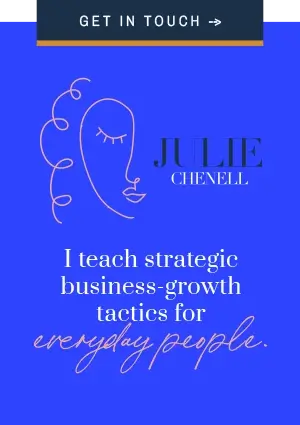This question comes up all the time. How do you know if you can afford that:
- Mastermind or Coach
- New House
- New HIre
I’m going through that process right now with a home we’re thinking of buying. Can we really afford it? What does that mean anyway?
Last week I sent out my best money advice for 2021 and I hope you’ll read it and implement. Assuming you have, when a big opportunity, idea, or purchase comes your way, how do you make a good decision about where to spend your $$?
I’m sure there are a million ways to do this, so I won’t pretend to be the supreme authority on this – however as someone who’s been saving for the past five years – I hear from financial wizards things like “Yeaaaa you are definitely over the top when it comes to having cash flow”. I think people probably can’t go wrong if they do what I did.
So here are the questions I would ask yourself, and the ones I’m asking myself about this new home Alex and I have our eye on.
Can you afford the initial investment?
Afford could mean…
- Paid in full – you have the initial investment in cash ready to go (or you can liquidate something)
- Paid over time – there is a payment plan for the initial investment that makes it so you can make the first payment from savings
- Put on a credit card/equity credit line – you might have a credit limit that can support it and you’re willing to take the risk because of the answer to the questions below
With each bullet point, your risk gets higher but it doesn’t mean you can’t do it. It just means, ask yourself the remaining questions (you should anyway).
Right now the home we’re looking at is listed at 2,250,000. We had planned to spend 1.5M. So it’s above our budget. Can we pay 20% down on a 2.25M home? Yes we could. We’d rather it be smaller, but that would be $450,000 down to afford primary mortgage insurance. For us, we hit #1. There’s no option for #2 in home buying, and #3 is not an option for us.
Can you afford the ongoing investment?
This is a really important question to ask yourself. What are the ongoing payments to that program, coach, home, investment, etc. With this question, it really boils down to a percentage. In the home buying space, they recommend your mortgage, taxes, and insurance should be no more than 30% of your monthly budget. If you’re thinking about a mastermind or program, this percentage might be different BECAUSE of the money making potential return. Probably this question is the hardest of all since it varies.
This home with 20% down, $18k a year in property taxes, and insurance, would cost us somewhere between $8-9k a month. Right now I bring home about $30-$40k a month net, so this puts us at $9-10k a month for our home. So we’re still in that acceptable range of percentages.
Another thought is to see how much your savings is dented from the initial investment, and can it provide any “cover” for you in the event you’re stretched? For us, our down payment will not wipe out our savings. Our last house – it did. The house before that? I went into debt to buy.
What are the additional costs associated with the investment?
Most people skip this question. What are the other costs that come up BECAUSE of that investment. In a mastermind or a coaching program, are you going to have to pay for tools, for other hires, or ad spend? Are you going to travel or visit people? Doing this exercise is not meant to deter you, it’s simply meant to prepare you.
For our home, we know that the electric and heat will go higher, we also know closing costs will be around $30k and we’ll probably need another $50k in moving expenses/new furniture because the home is so much bigger.
We have the cash on hand, and we also have to work into our budget an additional monthly uptick for things that will cost more at the new house.
What are the ongoing benefits of the investment?
Now that you’ve done all the hard not fun work of thinking about those things, ask yourself, “What are the benefits to this investment?” Stick to NON monetary benefits first, because those are important too (and almost always have a monetary value somewhere if you dig enough). If you’re considering a coach or program, you might think the benefits are…
- Having a coach that will help me not quit when the going gets tough
- New referral relationships and connections that open doors I couldn’t open on my own
Just sit with all the benefits. Owning the home we’re looking at would provide a much longer list than I can put in this email. From experiences, opportunities, lifestyle change, hosting people, the list goes on and on.
Can you get the money back in some way?
Here’s the ROI question. After doing the benefits question, you might start to see ROI where you didn’t before. Of course when doing any sort of money making endeavor you should calculate the potential ROI in NEW revenue, SAVED revenue, or FOUND revenue.
- New means new customers and new money.
- Saved means learning to do things more efficiently so you don’t spend as much. Avoiding mistakes and lost opportunities you didn’t know about.
- Found revenue means making more with the customers and offers you’ve got.
With a purchase like a house, generally real estate is a safe investment, especially over time. Now you could find plenty of people who’d say otherwise, but MOST of the wealthiest people on planet Earth own real estate. SO there’s that. In a worst case scenario you might not get all your money back if there’s a collapse. But if you can ride it out, the market usually recovers and you can AT LEAST get your original investment back. So that $450k we put in, will come back in the event we decide to sell.
What stage of life/business are you in right now, and is it conducive to what you want to do?
Really important question here for last. No matter HOW MUCH you think money is more valuable than time, it is not. Time is your most precious resource. Most of us have ZERO time to waste. Look at your life and what you’re trying to do. Is there a reason you’re saving for some time in the future that can’t be experienced and enjoyed now? There’s a book called Die With Zero and it’s a really good read. It helps you see how important it is to not over save. Something I think I’ve been guilty of. Now if you’re a mad spender, read Die with Zero with caution. Cause it’ll definitely give you a lot of hard evidence to keep spending on experiences and not waiting til the end of your life to enjoy your money.
This question for us on the house was – if not now, when? We’re certainly not going to buy a farm with 14 acres when we’re in our 60’s and all our kids are grown. Another issue for us is that if we want to change schools, we need to do it before September because we don’t want to move anyone who’s in high school (Evan is graduating and Ellie is in a different school system already, so we need to move ahead of Eden’s high school career).
I hope these questions help you when evaluating a purchase.
- Can you afford the initial investment?
- Can you afford the ongoing investment?
- What are the additional costs associated with the investment?
- What are the ongoing benefits of the investment?
- Can you get the money back in some way?
- What stage of life/business are you in right now, and is it conducive to what you want to do?
Remember that the benefits and ROI are AS important as the percentages and investment amounts, because while money replenishes, time does not.
xx Julie









0 Comments